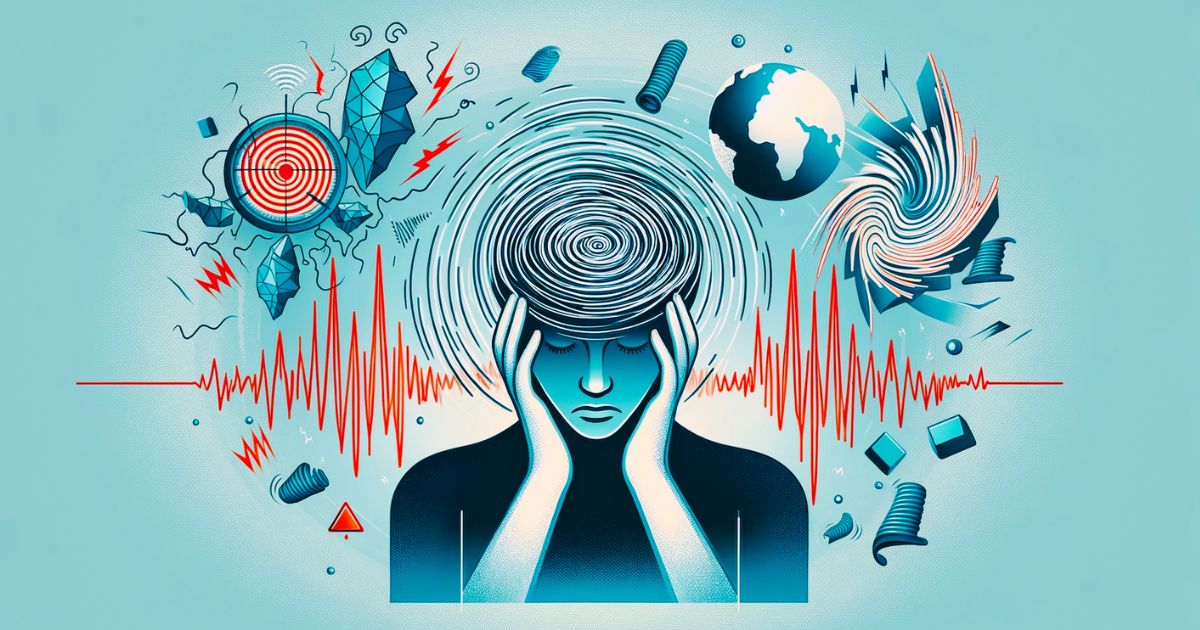I recently read an article from the New York Times about individuals experiencing persistent dizziness symptoms after an earthquake. This is not something I have encountered at a clinical level, but I found it interesting.
It seems unlikely that an earthquake would directly cause an organic issue with vestibular system without any physical trauma involved. It would, however, seem plausible that an earthquake could lead to symptoms consistent with persistent postural perceptual dizziness (PPPD) or mal de debarquement. Both PPPD and mal debarquement are central (brain related) disorders where the brain has difficulties with integrating sensory information from the senses of touch/somatosensory, the inner ear and vision.
PPPD is often induced by some sort of initial event including but not limited to inner conditions, vestibular migraine, or even psychological distress. Individuals that have the highest risk for developing PPPD are those with prior or current medical history of migraine or anxiety. Those with this condition typically describe a sensation of rocking or swaying type dizziness that is exacerbated by an upright posture, with physical and visual motion, and complex visual patterns. The consensus document from the Barany Society can be found here.
 Mal de debarquement is induced by prolonged passive motion, such as riding on a cruise ship or airplane. Individuals with a history of migraine also seem to be at a higher risk of developing this condition. Those with mal de debarquement also tend to describe a rocking or swaying type dizziness with similar exacerbating factors as PPPD. With this condition, the symptoms should improve with re-exposure to passive motion. The consensus document from the Barany Society can be found here.
Mal de debarquement is induced by prolonged passive motion, such as riding on a cruise ship or airplane. Individuals with a history of migraine also seem to be at a higher risk of developing this condition. Those with mal de debarquement also tend to describe a rocking or swaying type dizziness with similar exacerbating factors as PPPD. With this condition, the symptoms should improve with re-exposure to passive motion. The consensus document from the Barany Society can be found here.
“…PPPD manifests with one or more symptoms of dizziness, unsteadiness, or non-spinning vertigo that are present on most days for three months or more and are exacerbated by upright posture, active or passive movement, and exposure to moving or complex visual stimuli. PPPD may be precipitated by conditions that disrupt balance or cause vertigo, unsteadiness, or dizziness, including peripheral or central vestibular disorders, other medical illnesses, or psychological distress.”
Dizziness and Earthquakes
One study conducted in Japan found a correlation between increased anxiety levels and poorer equilibrium function in individuals exposed to earthquakes and aftershocks. This suggests an interaction between the vestibular and corticolimbic systems, which could explain the reduced equilibrium in patients with higher anxiety levels.
Another Japanese study found a link between anxiety and motion sickness in individuals experiencing dizziness related to post-earthquake conditions. Additionally, a study from Turkey reported higher rates of panic disorder, anxiety, and post-traumatic stress in individuals experiencing persistent dizziness following earthquake exposure.
These articles point toward the psychological impacts of being exposed to an earthquake potentially leading to persistent dizziness. Unfortunately, none of these studies looked for a prior history of migraine in those individuals that were most impacted by post-earthquake related dizziness. It would be interesting to see if this is also an at-risk population for post-earthquake related dizziness.
“These studies highlight the psychological impacts of earthquake exposure, potentially leading to persistent dizziness. Patients with PPPD caused by psychologically distressing situations suggest that earthquake exposure could trigger similar symptoms. Future studies should explore the correlation between migraines and post-earthquake dizziness, and whether treatments for PPPD or mal de debarquement could alleviate these symptoms.”
I have personally seen patients with PPPD caused by psychologically distressing situations and it would seem plausible that exposure to an earthquake could lead to PPPD type symptoms for some individuals. I am hopeful that future studies will investigate any correlation between migraine and post-earthquake related dizziness symptoms. It would also be interesting to see if treatments for PPPD or mal de debarquement would improve the post-earthquake related dizziness symptoms for these impacted individuals.
Additional research is needed in this area to help better understand the psychological interactions with the vestibular system.






